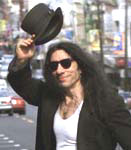
SUBSCRIBE
to the PRODOS BULLETIN!
Don't miss the updates! CLICK HERE NOW
|
This is a moderated discussion list |
"I welcome ideas, feedback (including
words of praise!), leads, suggestions!"
Contact PRODOS

Join the worldwide Celebrate Capitalism™
campaign promoting individual rights, profit, private property,
innovation, freedom, creative thinking: Find out more
![]()
Internet Radio >> Discover the Power
>> Of Ideas
Justice Clarence Thomas: A Journey into American Ideals
GUEST:
James Valliant In his "dissenting
opinion" in the Kelo vs New London eminent domain case, United
States Supreme Court Justice Clarence Thomas takes us on a journey
into the thinking and the spirit of the American Founding Fathers.
With San Diego based attorney, James Valliant, we analyse Justice
Thomas's approach and learn about how the framers of the American
Constitution approached defending man's rights - defending it
against the very kinds of people represented by Justice Stevens and
the Supreme Court's majority
opinion!

Justice Clarence Thomas
United States
Supreme Court
San Diego-based prosecuting
attorney and
author of The
Passion of Ayn Rand’s Critics
Topics covered include ...
-
Early influences on Justice Clarence Thomas include Thomas Sowell and Ayn Rand.
-
Framers of the American Constitution sought to create a scientific, rational way to achieve justice.
-
Reading Justice Thomas’s dissenting opinion in Kelo v New London is a journey into the soul of America. A history lesson!
-
Thomas and Scalia, in their decisions, will take the reader on an historical excursion of the way that the language was understood at the time of the writing of the constitution.
-
What did “public use” mean at the time of the writing of the constitution?
-
What did the Supreme Court majority decision do with the term?
-
Is the 5th Amendment about giving the government the permission to take property, or about limiting the government’s power to take it?
-
What did Justice Thomas have to say about this?
-
The 9th and 10th Amendments –> read the rights of the individual people broadly and the rights given to the government narrowly.
-
The purpose of the constitution as a whole is ... ?
-
The British Civil War. The development in Britain of a radical ideology that influenced the American Founding Fathers.
-
The Founders’ study of ancient history and how democracy was lost in Athens and the Republic was lost in ancient Rome.
-
Enlightenment scientists as statesmen.
-
Justice Thomas quotes Blackstone’s defense of private property as the foundation of law.
-
Rights are a unity.
-
The Campaign Finance Reform Bill – how it failed to understand the unity of rights. Commercial speech. Justice Thomas is the consistent advocate of free speech and property rights – the best Justice on the Supreme Court in these areas.
-
Thomas’s accusation that the majority decision on Kelo v New London seeks to eliminate liberties expressly enumerated in the Constitution.
-
The intended purpose of the Supreme Court and how the court has broken loose from it’s moorings.
-
James Valliant’s one criticism of Thomas’s and Scalia’s “historical excursion” style.
-
Valliant says that more than any other Supreme Court Justice in recent memory, Clarence Thomas clearly understands that rights are an individual thing – it’s the individual that possesses rights.
-
Thomas’s entire conception of the constitution is as a limitation on government.
-
Not all Supreme Court Justices view the constitution in it’s total purpose as a limitation on government.
-
How to read the Constitution.
-
“Necessary and proper…” an elastic clause.
-
The inversion of the 5th Amendment by the Supreme Court of the United States.
-
The Supreme Court’s use of precedence to destroy the very constitutional rights they are charged to protect.
Links
For
study purposes - not necessarily as an endorsement
Kelo vs New London
Supreme Court of the United
States: Kelo et al. v. City of New London et al.
-
Read the opinions of all the Supreme Court Justices here at the Legal Information Institute @ Cornell University Law School.
Speech by Justice Clarence Thomas
Given
at James Madison University in 2001 on the eve of the 250th birthday of
James Madison. Here is an excerpt for you ...
What is it about our Constitution that has allowed this great nation to enjoy unprecedented political stability and economic and social prosperity for more than two centuries?
There are two things that stand above all else: First, the principles upon which the American Constitutional order is based are universal principles, applicable to all people at all times ....
Second, Madison and other Framers made a significant advance in politics and political theory, an advance that allowed them to create a government strong enough to defend itself and the liberties of its people, yet limited enough, that it would itself not become the destroyer of the self same liberties.
http://www.jmu.edu/jmuweb/general/news/general_200132382450.shtml
- Listen to Erich Veyhl discuss "Eminent
Domain: Kelo vs London & the Logic of Destruction
>> click
here
Note from PRODOS: It was Erich Veyhl who first drew my attention to the arguments presented by Justice Clarence Thomas.
- Listen to Joe Wright discuss "Eminent Domain: Exploiting the 5th Amendment to destroy property rights" >> click here
- Justice Clarence Thomas Appreciation page >> click here
... Recommended (and sung) by PRODOS ...

Free
blogs. Free
hosting. But there's
one catch.
|
|
|
Transcriptions are greatly appreciated! To volunteer a transcription please CLICK HERE. Thanks! MAKE A DONATION! You love the show don't you? Who can blame you! :-) You want to support it in some way and help keep it going, right? Terrific! Then, would you like to make a donation? Whether it's $10 or $10,000, your contribution is greatly valued. To make a donation please CLICK HERE NOW. Thank you! |

